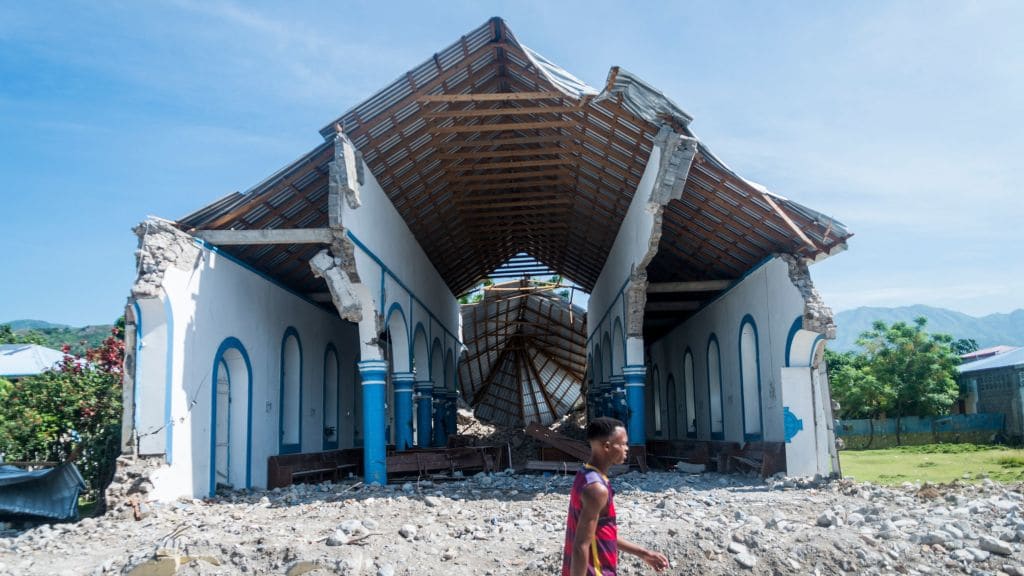Haitian officials are negotiating with gangs in order to get aid into country


A free daily email with the biggest news stories of the day – and the best features from TheWeek.com
You are now subscribed
Your newsletter sign-up was successful
Haiti continues to reel from Saturday's devastating 7.2-magnitude earthquake, with the country's Civil Protection Agency announcing on Monday that the death toll has increased to 1,419, with more than 6,000 people injured.
At least 7,000 homes were destroyed in the quake and almost 5,000 damaged, leaving 30,000 families homeless, The Associated Press reports. Search and rescue teams are still hoping they will pull survivors alive out of the rubble of collapsed buildings, but they are racing against time, as Tropical Depression Grace could hit Haiti on Monday night, bringing with it heavy rains that could trigger flash flooding and mudslides; some areas are expecting to see 15 inches of rainfall.
Haiti is the poorest country in the Western Hemisphere, and residents are waiting in line for hours to get money that has been wired from friends and relatives abroad. Humanitarian agencies are attempting to get much-needed food, water, and medical supplies into the country, and the U.N. Office for the Coordination of Humanitarian Affairs said on Monday that local officials are negotiating with gangs in Port-a-Prince's Martissant district, seeking safe passage for two humanitarian convoys. Southern Haiti is "a hot spot for gang-related violence," the agency said, and humanitarian workers are routinely attacked across the region.
The Week
Escape your echo chamber. Get the facts behind the news, plus analysis from multiple perspectives.

Sign up for The Week's Free Newsletters
From our morning news briefing to a weekly Good News Newsletter, get the best of The Week delivered directly to your inbox.
From our morning news briefing to a weekly Good News Newsletter, get the best of The Week delivered directly to your inbox.
The hardest hit towns are Les Cayes and Jeremie, and at Les Cayes General Hospital, there aren't enough beds for all of the wounded. People suffering from broken bones and internal injuries are being treated outside and in hallways, and the hospital is running out of pain killers and steel pins. "We are saturated, and people keep coming," Dr. Paurus Michelete told AP.
A free daily email with the biggest news stories of the day – and the best features from TheWeek.com
Catherine Garcia has worked as a senior writer at The Week since 2014. Her writing and reporting have appeared in Entertainment Weekly, The New York Times, Wirecutter, NBC News and "The Book of Jezebel," among others. She's a graduate of the University of Redlands and the Columbia University Graduate School of Journalism.
-
 The Olympic timekeepers keeping the Games on track
The Olympic timekeepers keeping the Games on trackUnder the Radar Swiss watchmaking giant Omega has been at the finish line of every Olympic Games for nearly 100 years
-
 Will increasing tensions with Iran boil over into war?
Will increasing tensions with Iran boil over into war?Today’s Big Question President Donald Trump has recently been threatening the country
-
 Corruption: The spy sheikh and the president
Corruption: The spy sheikh and the presidentFeature Trump is at the center of another scandal
-
 Rubio boosts Orbán ahead of Hungary election
Rubio boosts Orbán ahead of Hungary electionSpeed Read Far-right nationalist Prime Minister Viktor Orbán is facing a tough re-election fight after many years in power
-
 Key Bangladesh election returns old guard to power
Key Bangladesh election returns old guard to powerSpeed Read The Bangladesh Nationalist Party claimed a decisive victory
-
 Epstein files topple law CEO, roil UK government
Epstein files topple law CEO, roil UK governmentSpeed Read Peter Mandelson, Britain’s former ambassador to the US, is caught up in the scandal
-
 Iran and US prepare to meet after skirmishes
Iran and US prepare to meet after skirmishesSpeed Read The incident comes amid heightened tensions in the Middle East
-
 EU and India clinch trade pact amid US tariff war
EU and India clinch trade pact amid US tariff warSpeed Read The agreement will slash tariffs on most goods over the next decade
-
 Israel retrieves final hostage’s body from Gaza
Israel retrieves final hostage’s body from GazaSpeed Read The 24-year-old police officer was killed during the initial Hamas attack
-
 China’s Xi targets top general in growing purge
China’s Xi targets top general in growing purgeSpeed Read Zhang Youxia is being investigated over ‘grave violations’ of the law
-
 Panama and Canada are negotiating over a crucial copper mine
Panama and Canada are negotiating over a crucial copper mineIn the Spotlight Panama is set to make a final decision on the mine this summer
